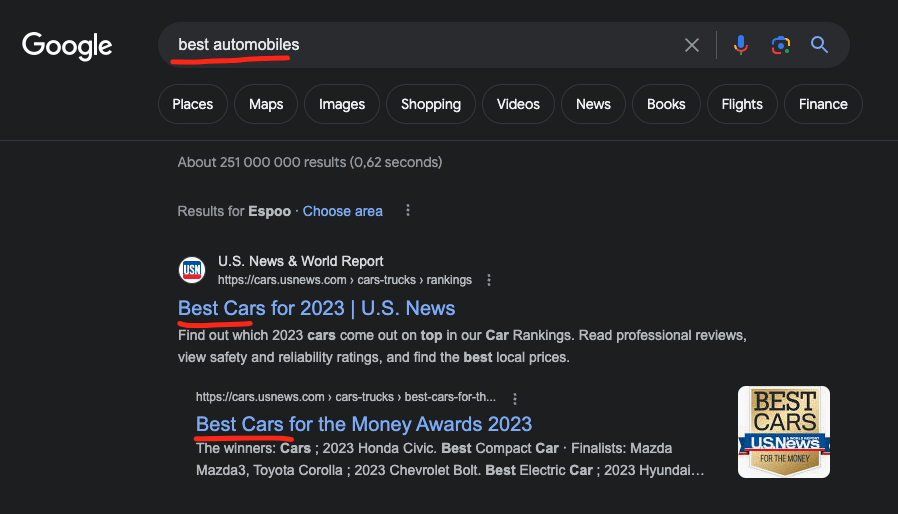These days, bloggers and SEOs shouldn’t worry about keywords at all.
Search engines use AI to read blog posts. The search engine bots thus read blog posts the way humans do.
All that matters is that the post is written humans-first.
There are no keyword tricks you can use to rank higher on search results anymore.
In this post, I will talk about why keywords don’t need to be exact and why you shouldn’t care about keywords when you write.
Keyword Ordering Doesn’t Matter
Keywords surely play a role in SEO. But the way Google uses keywords is their algorithm implementation detail.
As a blogger or content writer, you don’t need to worry about keywords as you write.
This is because the reality is more nuanced than simply stuffing your post with exact-match keywords.
Search engines, Google in particular, have evolved drastically over the years.
Google understands written content, language, and the intent behind searches very well.
For instance, Google knows that a search for “best automobiles” essentially means the same as “best cars.” You can verify this by doing a simple Google search:

Google’s algorithms interpret the intent behind our searches. This makes the strict order of keywords far less relevant than it used to be.
Therefore, an overemphasis on keywords, their densities, and their exact order isn’t ideal.
The most crucial aspect of your blog post is that it should be readable, engaging, and useful to human readers.
Modern search engines mimic human understanding of content. If your content resonates with your readers, it’s likely to resonate with search engine algorithms as well.
Keywords Only Do Harm
There’s a potential downside to the excessive use of exact-match keywords, especially when they don’t align with the natural flow of your content.
Sometimes, SEO tools might suggest search terms that have high search volumes but make little sense because they are typos or mistyped search phrases.

(This is one of the reasons I think SEO tools don’t work and I never use those.)
Using such awkwardly structured keywords could disrupt the readability of your content, and in turn, may negatively impact your post’s performance.
After all, no reader appreciates content that feels forced or unnatural, and search engines are no different.
Just write for humans and forget about search engines!
Example
Let’s say your SEO tool claims that “lose how to weight” is a low-competition keyword you should write about.
Let’s use common sense.
Google knows 100% well that “lose how to weight” is the same as “how to lose weight”.
Thus, if you wrote a blog post with the title “Lose How to Weight”, you’d not only look silly, but you’d also end up competing against all the posts with the correct title, “How to Lose Weight”.

What to Do Instead of Keywords?
Ranking high in search results is all about authority and trust.
Google already understands your content’s intent, regardless of your keywords.
Your primary concern should be to build a robust online presence by delivering content that is informative, helpful, and unmatched in its depth of coverage.
Take, for instance, a tennis business that wants to rank high on search results.
It can’t just add a few keywords around and expect to rank high. If it was this easy, everyone would do it.
To be recognized by Google, the tennis site needs to craft content covering every aspect of tennis. More importantly, the content must be of higher quality than any one of the existing posts.

Here’s what you should focus on instead of worrying about keywords:
1️⃣ Cover the topic exhaustively: Do your research and make sure you don’t leave any important aspect of the topic uncovered.
2️⃣ Inject your unique perspective: Include your unique takes, ideas, thoughts, and opinions to make your content stand out from the crowd.
3️⃣ Use original imagery: Illustrative and unique images not only make your content more appealing but also support learning.
4️⃣ Provide helpful resources: Linking out to useful resources or further readings helps support your facts and adds additional value to your readers.
5️⃣ Focus on long-form content: Studies show that long-form content often performs better in terms of SEO and audience engagement.
6️⃣ Aim for unparalleled quality: Every piece of content you create should be better than anything else available on the topic. Don’t aim just to compete; aim to be the best.
By following these guidelines, you’ll be focusing on what truly matters: building trust and authority through high-quality, comprehensive content that helps people.
Wrapping up
Search engines don’t care about keywords. They’re only interested in the overall value your content provides.
Aim to write for people, not algorithms. That’s the only thing you need to do! 🙂
Thanks for reading. Happy writing!
